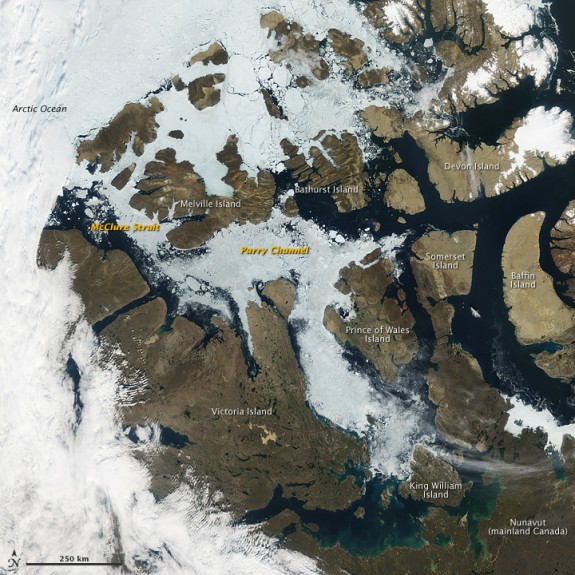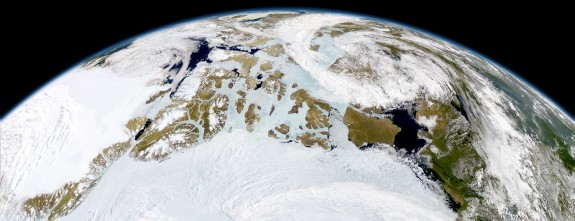The Arctic Is Running Out of Snow Even Faster Than It’s Running Out of Ice
The Arctic is losing snow cover twice as fast as it is losing sea ice

Northern Canadian snow cover as of August 2009. Photo: NASA Aqua-MODIS
As we reach into the the last leg of fall across the northern hemisphere, with cold temperatures creeping in and leaves (or even snow) falling to the ground, it becomes easier and easier to look past the record-breaking heat of the past summer—a scorcher that saw Arctic sea ice reach its lowest levels on record in mid-September at roughly half of the 1979-2000 average. But while most of our collective attention has been on tracking the downward streak of Arctic sea ice extent, an even more dramatic trend has been unfurling across the region: Arctic snow has been fading, fast. Much faster than Arctic ice.
Over the past thirty years, says a recent study by Chris Derksen and Ross Brown, northern snow cover for both North America and Eurasia has plunged at a rate of 21.5 percent per decade. Ice’s rate of decline over the same period was, by comparison, a measly 10.6 percent drop per decade. Driving the lack of snow, say the researchers, are climbing Arctic air temperatures. Across the polar region, the springtime temperature has risen by more than 1.5 degrees Celsius (3 degrees Fahrenheit) over the past 30 years.

Northern Canadian snow cover as of July 1999. Photo: NASA OrbView-2 – SeaWiFS
Just like sea ice, snow is particularly good at reflecting sunlight back in to space. When the snow starts to melt, this happens less and less. Less reflected sunlight means more energy is absorbed by the planet’s surface. More melting begets more heating, which begets more melting.
As it stands, we’re expected to start seeing ice-free summers in the Arctic Ocean in as little as the next 20 years. This latest news about the coming dearth of summer snow is yet another sign that something really, really weird is going on in the Arctic. Derksen and Brown:
When considered alongside the documented changes to the cryosphere including warming permafrost, reduction in summer sea ice extent, increased mass loss from glaciers, and thinning and break-up of the remaining Canadian ice shelves there is increasing evidence of an accelerating cryospheric response to global warming.
More from Smithsonian.com:
Stunning View of Arctic Could Be Last of its Kind
Everything You Need to Know About Arctic Sea Ice Melt, in One 10-Second Animated Gif
After Summer Cyclone, Arctic Sea Ice Reaches New Low
/https://tf-cmsv2-smithsonianmag-media.s3.amazonaws.com/accounts/headshot/smartnews-colin-schultz-240.jpg)
/https://tf-cmsv2-smithsonianmag-media.s3.amazonaws.com/accounts/headshot/smartnews-colin-schultz-240.jpg)